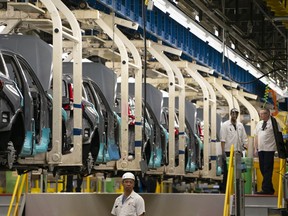‘We don’t want their cars. We want to make the cars in Detroit,’ Trump told FOX News

Article content
OTTAWA — After slapping 25 per cent tariffs on steel and aluminum, U.S. President Donald Trump is now threatening to cripple Canada’s auto industry with tariffs of up to 100 per cent.
Article content
Article content
In an interview with FOX News that aired on Monday, Trump said Canada has a “very big car industry” and falsely accused the country of having stolen it from the United States.
“They stole it because our people were asleep at the wheel,” he said.
Advertisement 2
Article content
“If we don’t make a deal with Canada, we’re going to put a big tariff on cars. Could be 50 or 100 per cent because we don’t want their cars. We want to make the cars in Detroit.”
Doug Ford, who is running for reelection as Ontario’s premier, pushed back against the idea during a fireside chat with the U.S. Chamber of Commerce on Tuesday.
He said “you just can’t flick a switch in the auto sector” and dismantle supply chains that have been deeply integrated between Canada and the U.S. since the 1960s.
“Auto parts go back and forth across the border up to seven, eight times, and then it gets assembled either in Michigan or another auto plant or up in Ontario,” Ford told the crowd.
“That’s the way it works, and it works well, and everyone benefits.”
Ford is among a Canadian delegation of politicians who will be pushing an economic message of cooperation between both countries in Washington D.C. this week.
Recommended from Editorial
Last week, Canada managed to pause Trump’s threat of 25 per cent tariffs on all Canadian goods for 30 days after announcing it would retaliate with $155 billion worth of tariffs.
Article content
Advertisement 3
Article content
But the reprieve only lasted a few days, as Trump signed two executive orders that would impose 25 per cent tariffs on steel and aluminum on all countries, including Canada.
Those orders, according to a Canadian government official, are set to come into force on March 12.
Canada, with its abundant hydroelectricity resources, is by far the biggest supplier of aluminum to the U.S. but also the largest source of imported steel in the U.S.
Imposing tariffs on these sectors would disrupt not only defence, energy and automotive sectors, but also large distributers of canned beverages and foods.
U.S. Chamber of Commerce senior vice president for the Americas, Neil Herrington, said on Tuesday the challenge with aluminum is “particularly acute.”
“U.S. aluminum producers simply have no capacity to replace imports,” Herrington said, adding that net imports constitute 80 per cent of U.S. domestic demand.
“Where do roughly 60 per cent of those imports come from? That’s correct, from our great family in Canada.”
Trump has been consistently promoting the idea that Canada should be pushed into economic submission until it becomes the 51st state.
Advertisement 4
Article content
Last week, Prime Minister Justin Trudeau told business leaders Trump is serious about wanting Canada to become part of the U.S., likely to secure access to critical minerals.
When asked by a FOX News host if the threat was real, Trump replied “yeah, it is.”
“I think Canada would be much better off being a 51st state, because we lose $200 billion a year with Canada. And I’m not going to let that happen. It’s too much,” he said.
That $200 billion figure is the sum of the U.S. trade deficit with Canada and U.S. defence spending of which Canada allegedly benefits, a Trump transition official told CNN.
In 2023, the U.S, had a trade deficit of $67.9 billion with Canada, according to data from the U.S. Commerce Department, which is largely due to energy imports.
Trump insisted he loves Canada and has “many friends” there, among which are former hockey star Wayne Gretzky, but claimed the U.S. is subsidizing their country.
“If I take away the subsidy, Canada really ceases to become a viable nation,” Trump said.
It was unclear on Tuesday if and when Canada would retaliate to the latest tariffs on steel and aluminum.
Advertisement 5
Article content
Speaking to reporters in Paris early in the morning, Trudeau would not immediately commit to it: “As usual, we hope that it will not come to that,” he said.
Later in the day, Finance Minister Dominic LeBlanc was headed to the U.S. capital, where he was set to discuss with Trump’s Commerce Secretary Howard Lutnick, according to a source.
Ford also encouraged U.S. business leaders to get their message out to Trump.
“Let’s stop wasting time and energy and effort fighting each other, threatening tariffs that will only hurt workers, hurt businesses and cost more for families,” he pleaded.
Opposition parties have been pushing the government to act swiftly to react to these latest threats, while at the same time recognizing how unpredictable Trump can be.
“It’s becoming difficult to offer rational responses in a situation where the main player in front of you is not,” said Bloc Québécois MP Mario Simard in an interview.
“Are these tariffs going to disappear tomorrow morning?”
— With files from Antoine Trépanier.
National Post
calevesque@postmedia.com
Get more deep-dive National Post political coverage and analysis in your inbox with the Political Hack newsletter, where Ottawa bureau chief Stuart Thomson and political analyst Tasha Kheiriddin get at what’s really going on behind the scenes on Parliament Hill every Wednesday and Friday, exclusively for subscribers. Sign up here.
Our website is the place for the latest breaking news, exclusive scoops, longreads and provocative commentary. Please bookmark nationalpost.com and sign up for our newsletters here.
Article content







